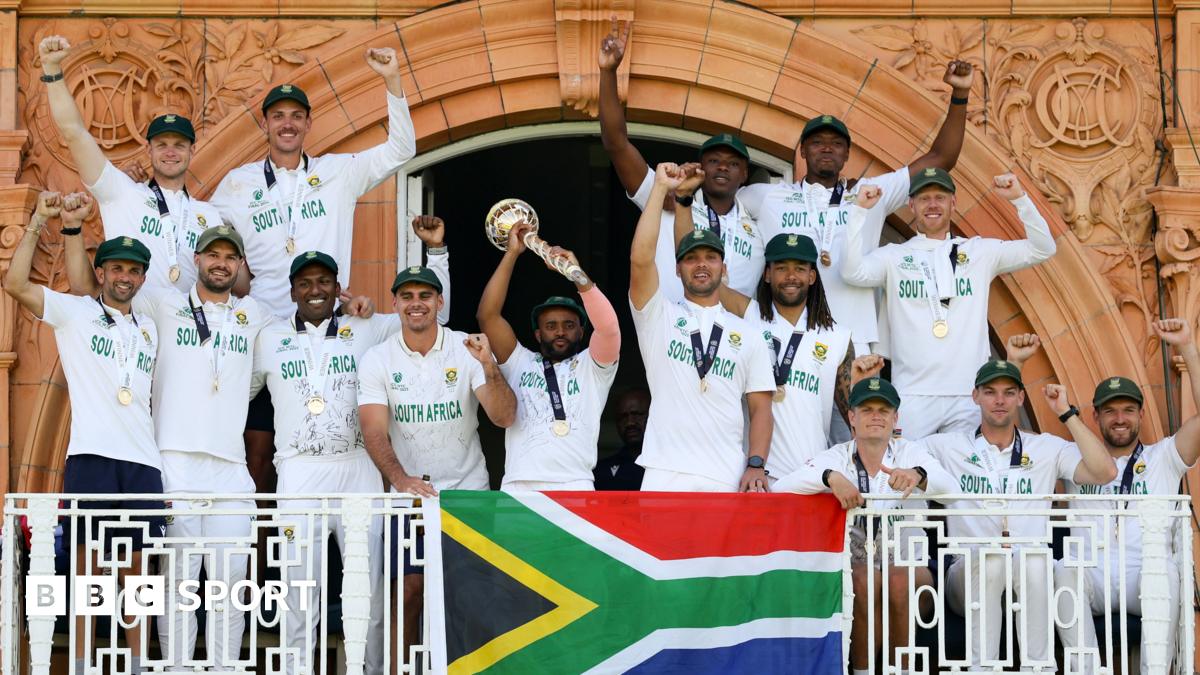South Africa beat Australia at Lord's to win their first global men's title since 1998 South Africa's World Test Championship triumph "stirred the emotions" of the country, but there is "still work to be done" on the format, says Proteas legend AB de Villiers. Temba Bavuma's sidebeat Australia by five wicketsin the Lord's final last week to end the country's 27-year wait for a men's global title. The victory comes after a number of near misses in International Cricket Council (ICC) tournaments that earned the Proteas their unwanted "chokers" tag, but De Villiers hopes that can now become a thing of the past. "We've had some very disappointing and sad ends to a lot of campaigns, especially the World Cups, but now it's time to start believing that we can do this more often," he told BBC World Service's Stumped podcast. Building on their Test success may be tricky, though, as South Africa play only four Tests in the next 16 months - two in Zimbabwe in the next month, that are not part of the World Test Championship, and two in India in November. Any sort of victorious homecoming for the red-ball side will have to wait even longer with the Proteas' next home Tests not scheduled until October 2026, when they face Australia in a three-match series. "[This moment] won't be lost," De Villiers said. "It was too big and too special for all South Africans - it was a Test match no one will ever forget. "But yes, to a certain extent, something needs to be done. "I saw the schedule that came out for the next cycle of the WTC and there is an improvement, but I still feel there's work that needs to be done there to just to get it as consistent as possible and as fair as possible for all for all Test-playing nations." The 2025-27 WTC cycle began on Tuesday and, as it stands, the number of Tests each team plays over the two years varies significantly. South Africa played 12 matches to qualify for the recent final, the joint-fewest of the nine sides and 10 fewer than England, who played the most, with percentage of points earned used to determine the standings. There is also a discrepancy in who each nation plays, with some highlighting a favourable schedule for the Proteas in 2023-25 qualifying that meant they played just two home Tests against India and did not face Australia or England at all. By contrast, in the new cycle they have the two aforementioned Tests in India and host both Australia and England for three Tests apiece in 2026 and early 2027. "You want to get to that final feeling like you've played against all these nations," De Villiers added. "Maybe a four-year cycle would be nice. We've done that in the past with one-day internationals, so why not in Test cricket? "It would make sense and it would give the organisers just so much more time to get a really fair, well-balanced system out there. "It's a long time until our next Test match, but there's no doubt it won't be forgotten. "I've absolutely no doubt the Proteas have sort of stirred the emotions of the South African cricketing fans and they will patiently wait for that next encounter." Listen to the full interview with South Africa great AB de Villiers on the Stumped podcast, available on BBC Sounds, from Thursday.
De Villiers calls for WTC change despite SA victory
TruthLens AI Suggested Headline:
"AB de Villiers Advocates for World Test Championship Reform Following South Africa's Victory"
TruthLens AI Summary
South Africa's recent victory over Australia at Lord's marks a significant milestone for the national cricket team, as it represents their first global men's title since 1998. This World Test Championship triumph has been celebrated across the nation, with former Proteas star AB de Villiers emphasizing the emotional impact of the win on South African cricket fans. Temba Bavuma's team secured the title by defeating Australia by five wickets, breaking a long-standing drought that had seen the team earn the 'chokers' label due to their history of near misses in major tournaments. De Villiers expressed hope that this victory could help change the narrative surrounding South African cricket, encouraging a belief that the team can achieve success more frequently in the future. He acknowledged the importance of this victory in the context of previous disappointments in World Cups and other competitions and urged fans to embrace this moment as a turning point for the sport in South Africa.
Despite the triumph, de Villiers pointed out that there are significant challenges ahead for the Proteas, particularly in terms of the scheduling of Test matches. With only four Tests scheduled over the next 16 months—two in Zimbabwe and two in India—opportunities for the team to build on their success will be limited. Furthermore, the next home Test series is not set until October 2026, when they will face Australia. De Villiers called for reforms in the World Test Championship format, arguing for a more equitable and consistent schedule that allows all Test-playing nations to compete fairly. He highlighted the discrepancies in the number of matches played by different teams, which can lead to imbalances in competition. Proposing a four-year cycle similar to that of one-day internationals, de Villiers believes this change would allow organizers to create a more balanced and fair system for Test cricket. As the Proteas look forward to their next matches, he reassured fans that the significance of their recent victory will not be forgotten, and he urged them to remain patient as they await future encounters on the field.
TruthLens AI Analysis
You need to be a member to generate the AI analysis for this article.
Log In to Generate AnalysisNot a member yet? Register for free.
